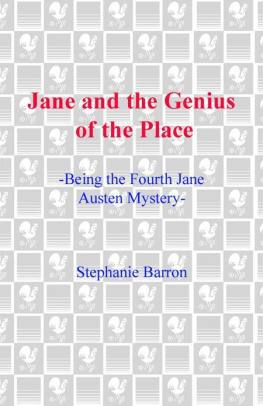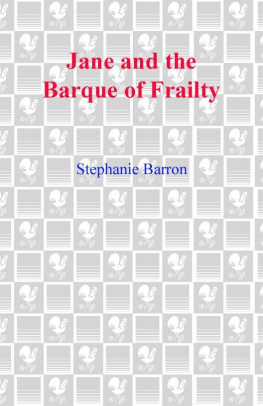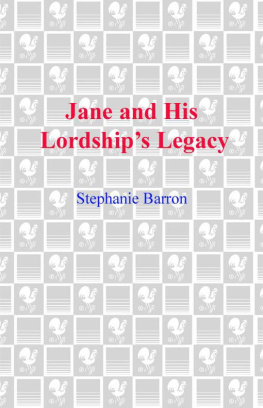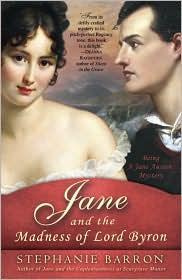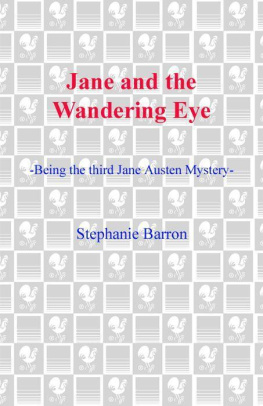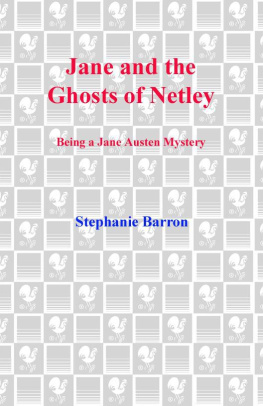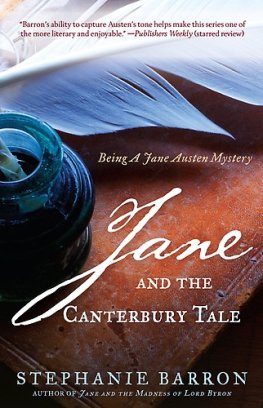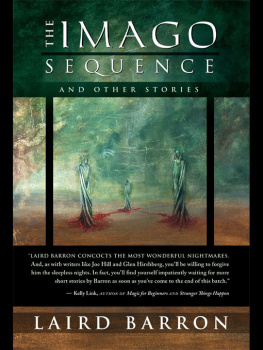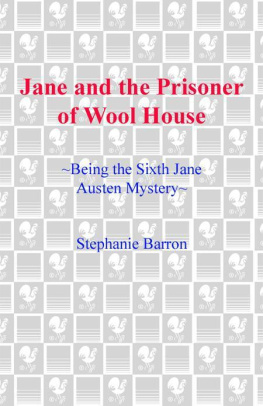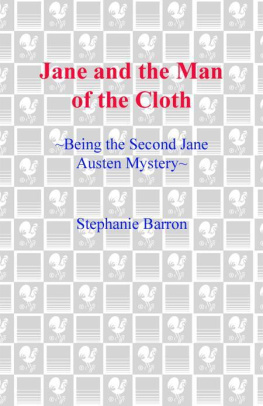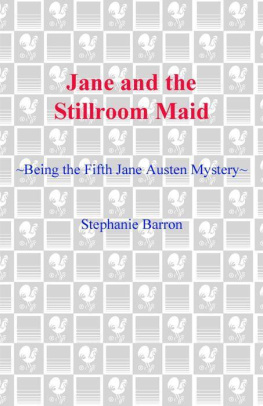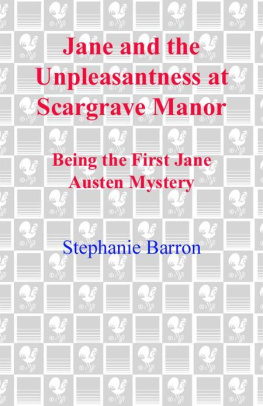Annotation
The book cleverly blends scholarship with mystery and wit, weaving Jane Austen's correspondence and works of literature into a tale of death and deceit.
Stephanie Barron
Jane and the Genius of the Place
In laying out a garden,
the first and chief thing to be considered
is the genius of the place.
-- ALEXANDER POPE, 1728
as quoted in
Observations, Anecdotes and Characters of Books and Men,
by Joseph Spence.
Being the Fourth Jane Austen Mystery
Dedicated to the memory of Ruth Connor,
whose genius lives on in the places
and people she loved
Editor's Foreword
BRITISH NOVELIST JANE AUSTEN WAS BORN ON THE EVE of her country's conflict with its American colonies, in 1775, and died only two years after Napoleon's second abdication in 1815; yet the turmoil of England's passage through more than four decades of revolution and warfare is barely evident in her novels. As a result, her fiction has too often been dismissed as superficial or as reflecting the purely "female" preoccupations of domestic life. An Austen scholar might be quick to point out the naval influences in Persuasion, or argue that the subtle shifts in social practices and mores that Austen repeatedly chronicles could exist only in the broader context of political transformation -- but in the main, her fiction mentions military figures most often as they appear at a ball, and politics not at all.
Austen's letters, however, reveal her to have been anything but ignorant of the affairs of her day. As Warren Roberts points out in his engrossing work, Jane Austen and the French Revolution(Macmillan, 1979), the novelist habitually read the London newspapers and commented on the political news reported in them. She followed the battles and engagements of the Royal Navy with avid interest, having two brothers serving in ships of the line, and she spent the entire summer of 1805 near the coastline of Kent -- Napoleon's ground zero for invasion.
What a delight, therefore, to discover in this, the fourth of the long-lost Austen journals to be edited for publication, an account of Jane's life during a period known to her contemporaries as the Great Terror. For over two years, from May 1803 until August 1805, Napoleon Bonaparte planned the invasion of England with a passion bordering on mania. He beggared his treasury to build a flotilla of over a thousand ships, massed an army of one hundred thousand troops in the ports of the Channel coast, and goaded his reluctant naval commanders into attempting to breach the remarkably effective British blockade of France. Never, since the Norman Conquest, had Britain faced so serious a threat of invasion from its neighbor; never again, until the Bat-tie of Britain in September 1940, would she confront so potent a military force, merely twenty miles from Dover.
Jane Austen witnessed the denouement of Napoleon's grand scheme from the idyllic vantage of her brother Edward Austen Knight's principal estate, Godmersham Park in Kent. The compelling events of those days-- which coincided with Canterbury's Race Week -- are here recounted for the first time.
In editing this manuscript for publication, I found Alan Schom's Trafalgar: Countdown to Battle, 1803-1805 (Oxford University Press, 1990) an invaluable guide to the period. But nothing can exceed the pleasure of my brief walk through the grounds of Godmersham itself, with its sheep-filled meadows roiling down to the Stour, on a hot afternoon in July.
Stephanie Barron
Evergreen, Colorado
Chapter 1
The Figure in Scarlet
Monday,
19 August 1805
MISS JANE AUSTEN -- LATE OF GREEN PARK BUILDINGS, Bath, but presently laying claim to nowhere in particular, given her esteemed father's recent death, and the subsequent upheaval in domestic arrangements -- might never be accused of dissipation. Not for Jane the delights of the ton, who may dance until dawn at the most select assemblies, or haunt the private gaming hells where hazard is played so scandalously high. At her time in life -- and she is hard on the heels of thirty -- there is something a little unseemly in a desire for modish dress, or a taste for fashionable watering-places, or a reckless disregard for social convention. Accustomed from birth as she has been to the modest lot of a clergyman's daughter, Miss Austen may only witness the habits of her more materially-fortunate brethren with shocked dismay, and trust that her fervent prayers -- sent Heavenward in all the humility of a woman mindful of her end -- might serve as intercession between the Fallen and their Maker.
Unless, I observed to myself with satisfaction on the present occasion, the more materially-fortunate brethren determine our Jane to be worthy of a little dissipation-on-loan. A visit to a race-meeting, perhaps, in all the glory of a barouche-landau excellently placed for viewing the horses, a picnic hamper overflowing with good things, and attendant footmen stifling in their livery. There can be few pursuits so conducive to the flutter of an ivory fan or the delicate flirtation of a muslin sunshade. And where but at the Canterbury Races, in the very midst of August Race Week, might one find all the excesses of human folly so conveniently placed to hand?
Within the compass of my sight, I assure you, were any number of incipient scandals. The countenance of more than one gentleman was flushed with wine and the course's promise, or perhaps the anxiety attendant upon heavy betting -- for in the decision of a moment, fortunes might be made or lost, reputations sacrificed, and ruin visited upon more than merely the horse.
From the vantage of their gay equipages, ladies young and old flirted with every passing swain, and offered raspberry cordial or spruce beer to such as were overcome by the heat. Our friends the Wildmans, from nearby Chilham Castle; the Edward Taylors, from Bifrons Park; and the Finch-Hattons, of Eastwell Park, in their elegant green barouche, all chattered gaily across the distance separating their parties. Footmen unpacked the heaviest of the hampers, and decanted the spirits from an hundred bottles, while stable lads walked the patient carriage horses under whatever shade might be found.
One dark-haired young woman, tricked out in a very fetching habit of red bombazine, with a tricorn hat and feathers, held pride of place on the box of her own perch phaeton -- a daring gesture in so public a gathering, and not for the faint of heart. It was a cunning little equipage, built for speed and grace, and possibly not unsuited to a lady's use in St. James Park -- but a rare sight, indeed, among the serviceable coaches of Kent. She drove a pair of matched greys, and led a snorting black gelding behind -- or rather, her tyger did. He was a diminutive, crab-faced fellow with a bent back, stifling in gold braid and livery, who sat hunched at the phaeton's rear, awaiting his mistress's commands, and feeding an occasional bit of greenstuff to the snorting black.
As I watched, the figure in scarlet drew a whip-point from her collar and tossed it to an admirer standing at the phaeton's wheel. He caught it neatly and held it to his lips like a spoil of victory;



